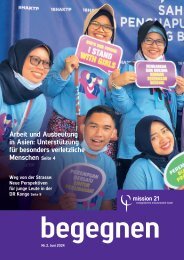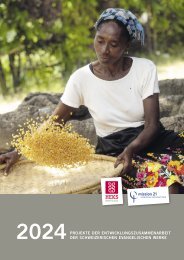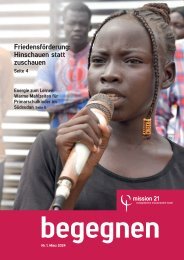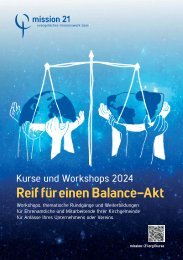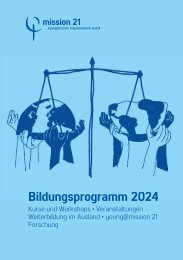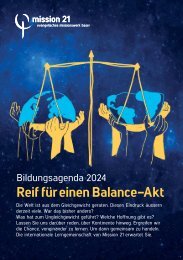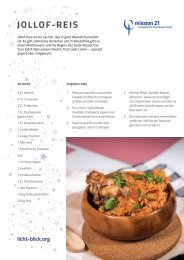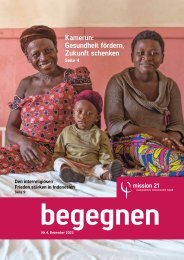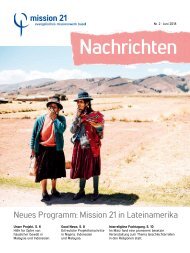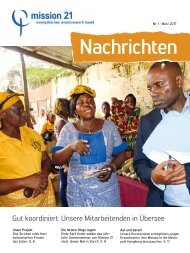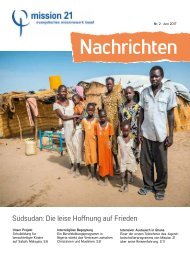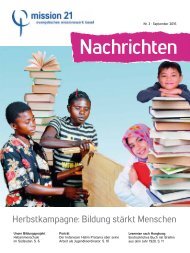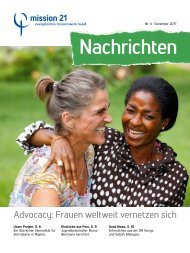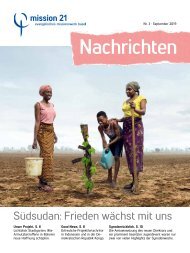Annual Report 2019
Annual Report 2019
Annual Report 2019
Create successful ePaper yourself
Turn your PDF publications into a flip-book with our unique Google optimized e-Paper software.
Editorial by the President<br />
Intercultural collaboration<br />
as a "visual aid"<br />
Do not conform to the pattern of this world, but be transformed by the<br />
renewing of your mind. (Romans 12:2)<br />
Johannes Blum<br />
What is the “pattern of this world”, or the spirit of the age? Generally<br />
speaking, it is probably whatever a particular generation considers to be<br />
right, what the media portrays as the truth, and what constitutes our culture.<br />
If we look back on past eras from this perspective, some contradictory<br />
considerations are also bound to surface. Nowadays, for instance, there<br />
are some voices urging us to go with the times, put the necessary reforms<br />
into practice and adapt our work to people’s existing circumstances and<br />
needs. But these critics reproach earlier generations of missionaries with<br />
having adapted too much to their times; they accuse them of failing to<br />
distance themselves sufficiently from the colonial spirit of the day. In<br />
“The Screwtape Letters”, the Irish writer C. S. Lewis gives a humorous<br />
description of the “spirit of the age”: each generation battles against the<br />
mistakes made by the previous generation, while turning a blind eye to<br />
its own errors. The previous generation had to cope with the problem of<br />
wildfires, whereas today’s generation is confronted with flooding – and<br />
yet everyone is still running around brandishing fire extinguishers! The<br />
spirit of the age often makes people blind to the errors committed by their<br />
own society.<br />
Intercultural cooperation offers a visual aid that helps us to see our<br />
own mistakes with its help, we can already reflect critically on our culture,<br />
here and now. Mission 21 has great potential in this area. If we can<br />
see and recognise our society and culture through the eyes of our partners<br />
in the global South, the spirit of the age can be put into perspective.<br />
Principles that we generally accept – such as progress, cost-effectiveness<br />
and efficient work processes – are suddenly brought into question.<br />
Intercultural Bible study opens up new avenues of access through<br />
dialogue with representatives of the churches. In the Democratic Republic<br />
of the Congo, and in discussions with Congolese Christians, I have<br />
arrived at a new understanding of many passages in the Bible. At the<br />
same time, I have realised that the Bible is very often interpreted in a<br />
Eurocentric way in Switzerland.<br />
But in the course of discussions among partners, dialogue of this sort<br />
is not merely an intellectual exercise: it also guides us towards personal<br />
relationships, and towards compassion. We share our partners’ joys; we<br />
are also brought face to face with their sufferings, which make us distressed.<br />
Vigorous support is the logical consequence. By joining with<br />
our partners, we endeavour to develop projects together that will enable<br />
native populations to lead their lives in dignity.<br />
Together, we want to foster peace and justice, to respond to the hardships<br />
of people who are afflicted by poverty and disease, and to give<br />
many of them the chance of a better future through education. We want<br />
to support our partner churches in actively practising charity in their<br />
neighbourhoods. By adopting their perspective, by engaging in intercultural<br />
dialogue and promoting interfaith understanding, these goals<br />
can be successfully achieved.<br />
Johannes Blum<br />
President, Mission 21<br />
5




